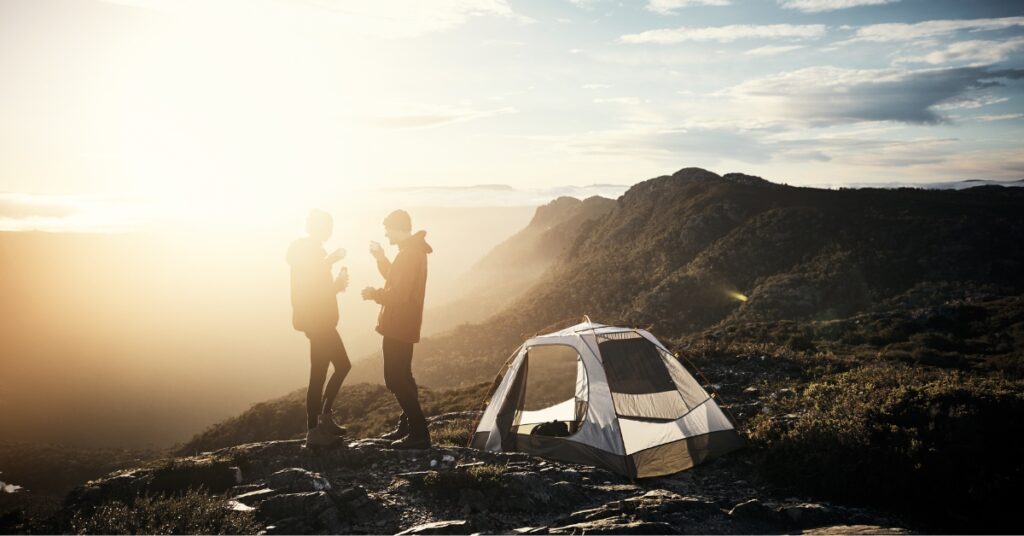
Are you planning your next adventure and need some camping tips and tricks to get you through it smoothly?
If the answer is yes, you’ve come to the right place. This article focuses on the best camping tips to make camping more comfortable, efficient, and enjoyable.
These camping tips for tent camping cover many topics, such as setting up camp, cooking food, staying warm and dry, and packing gear.
Of course, the best way to learn practical skills is through experience. But what if we don’t have any, or what we know might not be enough? And let me tell you straight away – you’ll never know everything you need to know about camping.
Mistakes can always happen to almost anyone. So, doing thorough research before any outdoor activity is always a great idea.
One of the most common mistakes is not packing the right gear. You often need to remember to bring essential items such as a first aid kit, a flashlight, a knife, or a stove. I’m one of these people who forgot a sleeping bag. Can you believe it?
But camping shouldn’t be stressful if you prepare well enough, and I understand that the preparation period can feel overwhelming. I’ve carefully put this list of beginner camping tips that you’ll find beneficial.
This camping tips list is a product of in-depth research and years of hands-on camping experience. Get ready to take some notes!
Before we jump on the first topic, here is a quick list of the 25 most important camping tips:
- Save As Much Space As You Can
- Always Let Someone Know Your Detailed Camping Itinerary
- Follow The Weather Forecast For a Few Days in Advance
- Prepare a Detailed Packing Checklist
- If Planning Your First Time Camping – Try Camping in Your Backyard
- Explore The Campsite or Campground Before Your Trip
- Invest Wisely in Your Gear if You’re At The Very Beginning of Your Camping Career
- Set Up a Camp During the Daylight
- Take Pictures While Setting Up the Tent
- Keeping Your Body Warm During the Cold Nights
- Collect Information About Wildlife
- Never Rely On a Phone Signal
- Never Go Camping Without the First-aid Kit
- Keep Insects and Bugs Away
- Bring Headlamps, Lanterns, or Flashlights
- Take Duct Tape Everywhere With You
- Think Well About the Food According To Your Eating and Cooking Habits
- Collect Yummy Yet Simple Recipes
- Bring Enough Drinking Water
- Purifying Water
- Bring a Trowel For Digging a Potty Hole
- Take a Shower Using Wet Wipes
- Be Careful With Setting Up a Campfire
- Respect Other Fellow Campers
- The “Leave No Trace” Principle
Save As Much Space As You Can
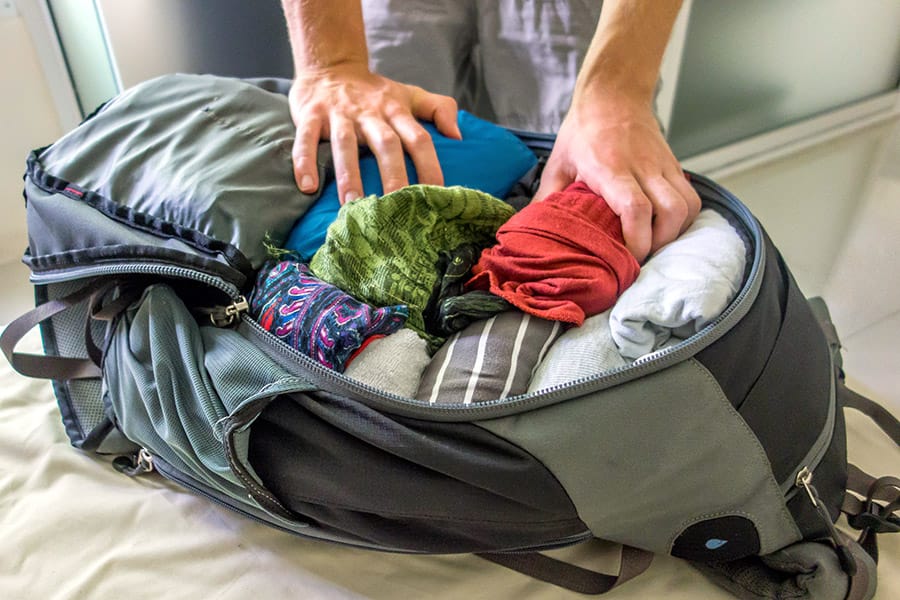
There are great ways to fold your clothes neatly. Try to roll up items such as t-shirts, tops, and everything else. You can hold them in a towel to keep them wrinkle-free. Smaller items like socks or underwear can fit into packing cubes or bags.
You can also save a lot of space by repacking food from its original package and placing it in smaller containers or zip bags. Repacking food will also reduce weight and keep your food fresh while camping.
Always Let Someone Know Your Detailed Camping Itinerary
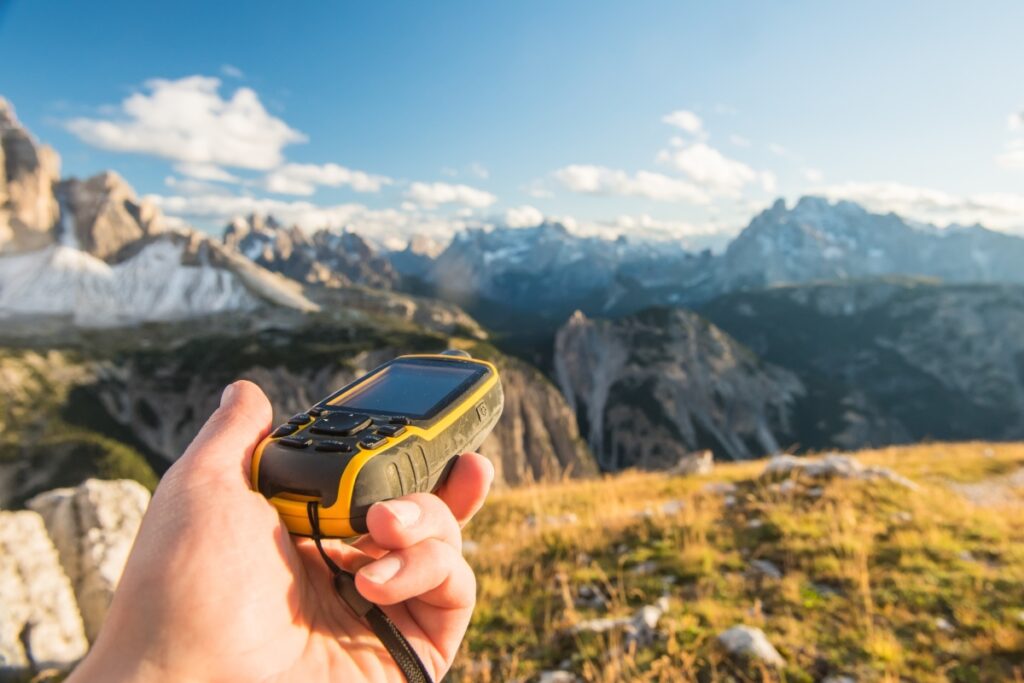
Leaving your family and friends information about where you will visit and when can save a life.
Here are a few things you should inform someone before you go camping:
- Your planned route and campsites.
- The dates of your trip and when you expect to return.
- The names of the people you are traveling with.
- The make, model, and license plate number of your vehicle.
- Your emergency contact information.
Many scenarios can occur: your phone can die, the GPS can lead you the wrong way, or it can get dark. You can help ensure that you are safe and that help will be available in an emergency.
Follow The Weather Forecast For a Few Days in Advance
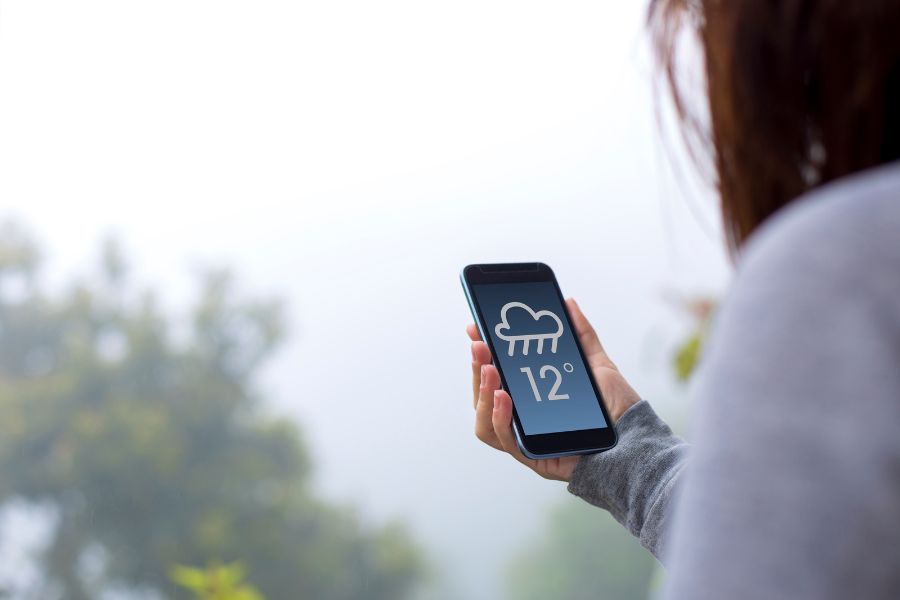
Checking the weather forecast the day before your trip may not be early enough, especially if you’re planning to go camping at a high altitude. Unstable weather conditions can ruin your plans, or even worse; they can surprise you on-site.
Since the weather forecast is never 100% precise, it’s always a good idea to prepare for some nasty weather and bring your rain gear just in case.
The previous two camping tips are the most important and always remember them.
Prepare a Detailed Packing Checklist
Having a checklist before camping can be a valuable tool to help ensure you have everything you need and prepare for your trip. A camping checklist can help you remember essential items and ensure you remember everything.
There are plenty of available camping checklists on the internet. However, check our blog post on the car camping checklist, and you will find the link to a ready-to-use PDF camping checklist.
Even though the blog post focuses on car camping, you can find valuable general advice there.
If Planning Your First Time Camping – Try Camping in Your Backyard
It is one of the best ways to break the ice. Pretend entirely you’re not at home, bring everything you would get with you, and see how it goes. It’s also a chance to try and set up the tent or use the camp stove.
If you think this wouldn’t work well for you, or you don’t have a backyard for that purpose or any backyard at all, you can also go somewhere close to your home and do the same test. This way, not only you’ll gain some experience, but you’ll build your confidence and independence.
Explore The Campsite or Campground Before Your Trip
Every camp is different, so gathering all possible information before you depart is essential. It includes the already mentioned weather conditions for that particular area, checking for wild animals, looking for exciting content, and reading about what to visit while you’re there.
You’ll need to book campgrounds in time, and they have their own rules, especially fire-related ones in the states where wildfires aren’t that rare.
My spectrum of advice would always go from making sure you’re safe to make sure you’ll have fun.
Invest Wisely in Your Gear if You’re At The Very Beginning of Your Camping Career
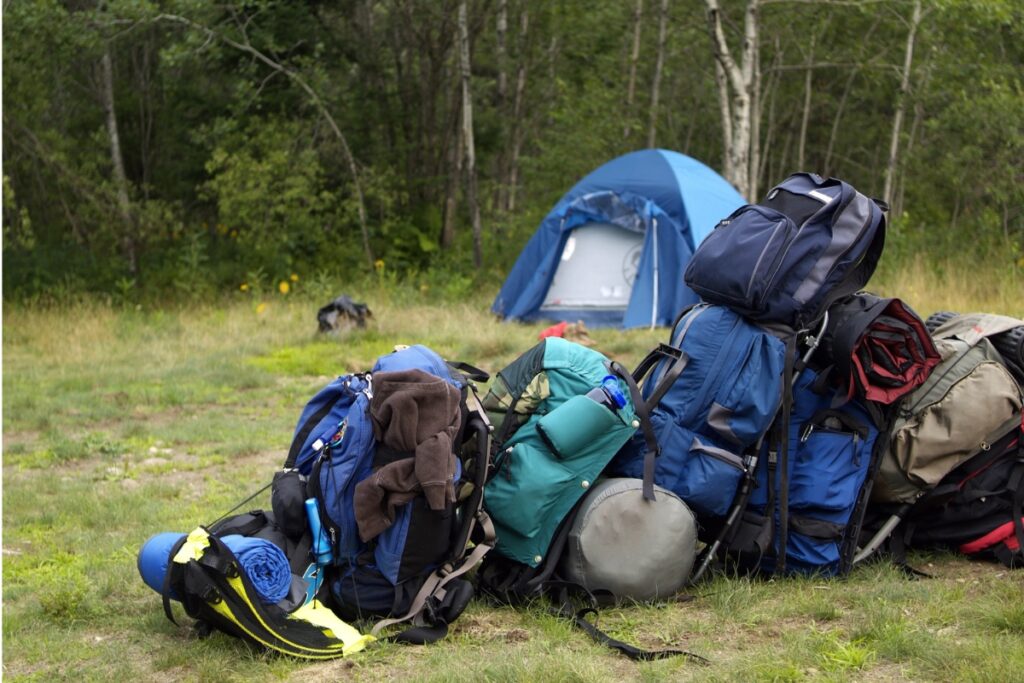
Gear is essential no matter how far you plan camping. However, there are items worth spending your money on, and there is stuff that doesn’t need to be expensive.
This point opens up a few questions you should have an answer to:
- Did you define your budget for this adventure?
- Is this a one-time thing, or do you want to get into it and eventually build up your skills?
- Are you going alone, with other adults, kids, or pets?
If you’re on a budget, don’t worry. Not all gear must be famous-branded, and you can always find suitable alternatives. But investing in necessary equipment such as a quality tent or sleeping bag would be great if you want to dedicate yourself to this activity.
Set Up a Camp During the Daylight
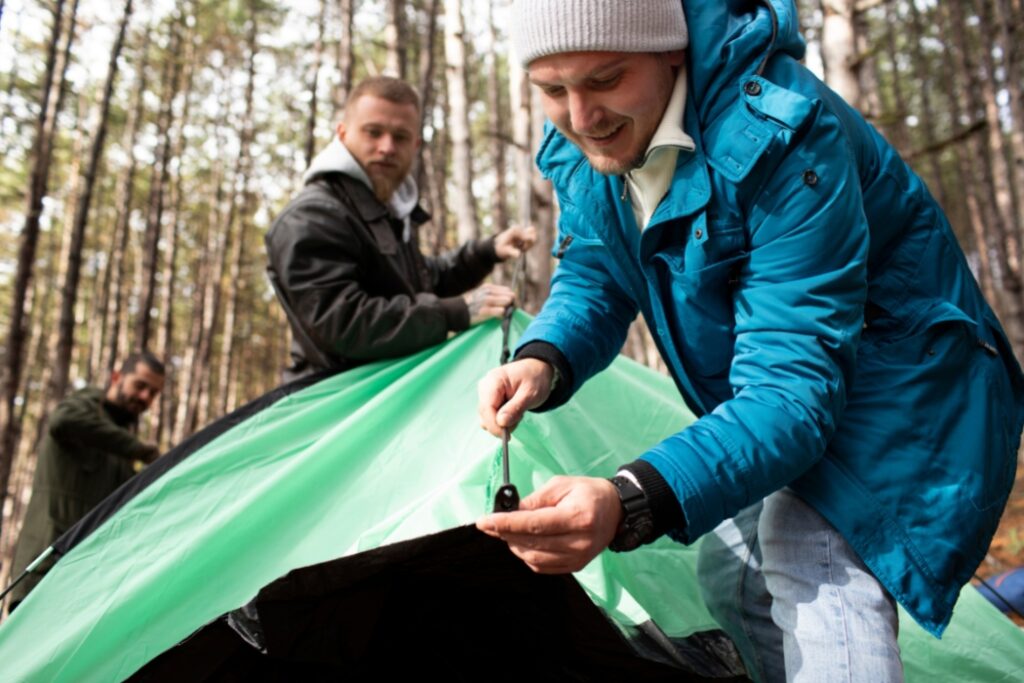
You don’t have to be an extra early riser and arrive at the campsite with the first rays of light, but setting up your camp in the dark is challenging and even dangerous.
It’s essential to use all the possible visibility to pick dry and flat ground, properly build a tent, explore the area, and prepare for the fire.
However, you may arrive late at the campsite for some reason and have to set up a camp during the evening or night hours. In that case, use a headlamp or flashlight and set camp in a safe and visible area.
Take Pictures While Setting Up the Tent
No, not selfies! Just pics of the tent.
Why?
I learned this incredible tip many years ago, and I’ve been using it successfully. The reason is quite simple – it’s difficult to pack a tent back if you don’t remember how.
Different tents can be set up differently, so you’ll want to record the process. Trust me; it’s not easy when you struggle with a massive tent for multiple people and have no idea how to pack it back.
Keeping Your Body Warm During the Cold Nights
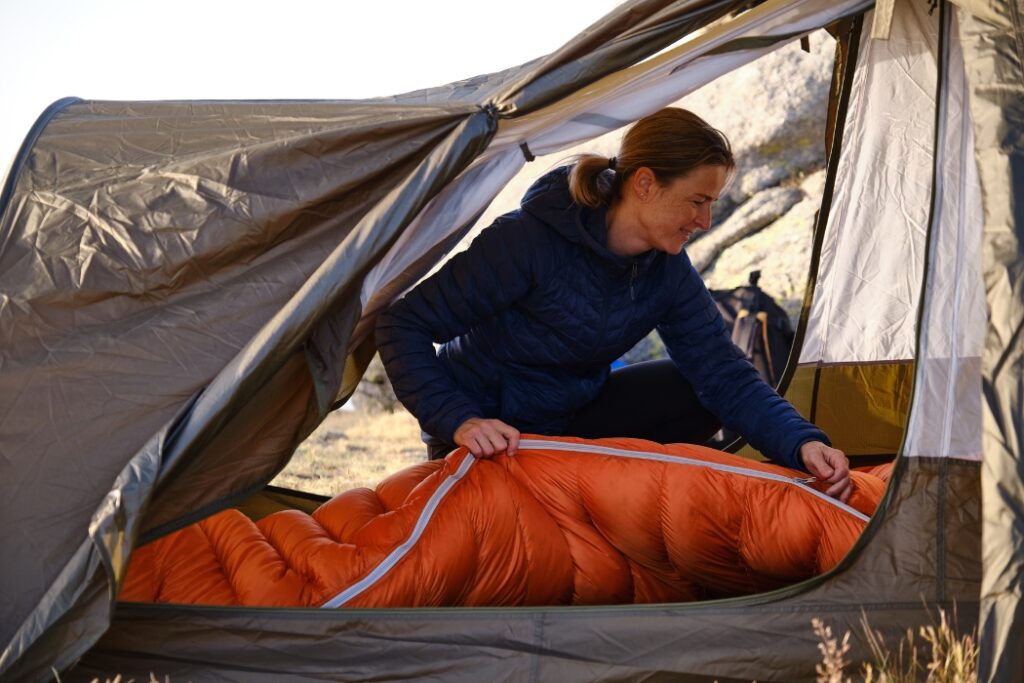
People often need to remember that the nights can get pretty cold, and they forget to bring enough clothes. A great way to preserve the heat inside the sleeping bag is to put all your extra clothes below your feet and keep them warm. Or you can also place a hot water bottle near you in the sleeping bag.
Pro tip: take extra care to buy a sleeping bag and a pad designed for the temperatures in the area you’ll be camping in.
Collect Information About Wildlife
Camping always raises the possibility of encountering different wild animals. If you travel to the mountains, there’s a great chance you’ll find yourself in a bear country. Any scented items must be stored adequately and read safety guidelines carefully.
If you follow the guidelines, you shouldn’t be afraid. We can make noise around the campsite to let them know we’re there. We often forget that wild animals are also scared of us and can react aggressively because they don’t expect us on their ground.
Never Rely On a Phone Signal
Nowadays, you can find affordable, portable GPS systems in all shapes and sizes. Solar chargers are now available for almost any phone and can be an excellent solution for a more extended camping trip. But if you must use your phone first, bring an external battery.
Your phone may lose signal in rural areas, so you’ll want to download maps to use them offline.
Besides that, as I already mentioned, you need to make sure your family or friends know your adventure and where you’re going if something goes wrong and you have no signal to dial anyone immediately.
Never Go Camping Without the First-aid Kit
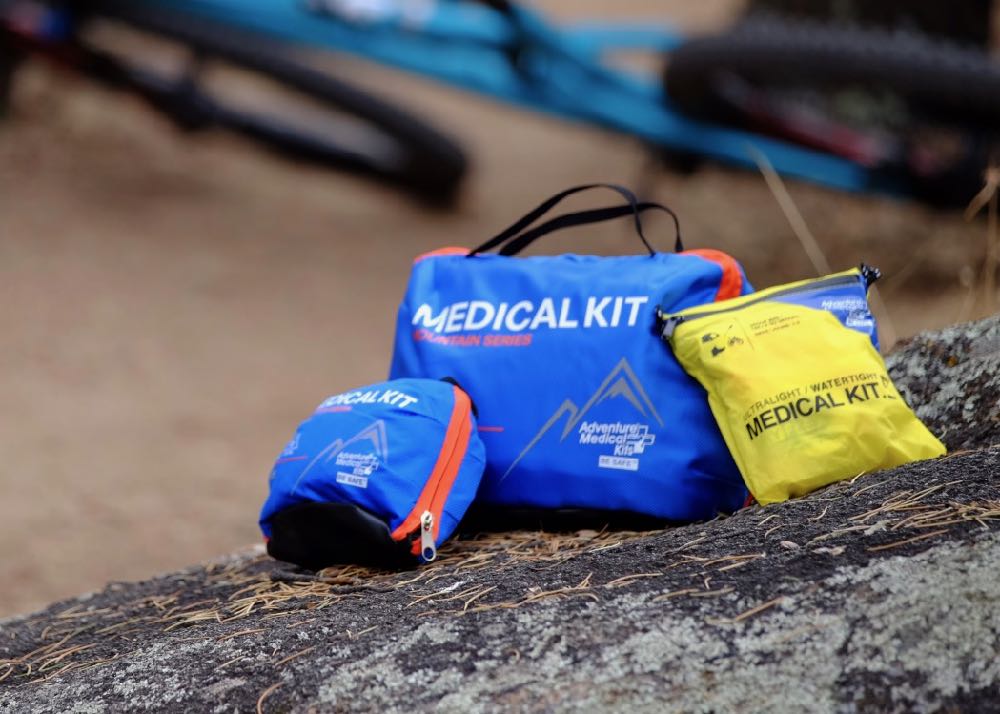
Hopefully, you won’t need it. But, as we never know what might occur in nature, it’s always a good idea to have it with you. I’m rarely using mine, primarily just for shallow wounds or calluses. I have it already packed in my closet; it’s on my camping list, so I will never forget it.
Most importantly, check the medications’ expiry dates from time to time inside the kit.
Here’s a list of the most common items included in the first-aid kit:
- Adhesive bandages in various sizes
- Antiseptic wipes or solution
- Tweezers
- Scissors
- Safety pins
- Disposable gloves
- Pain relievers such as ibuprofen or acetaminophen
- Blister treatments such as moleskin
- Antihistamines for allergies
- Insect bite treatment
- Sunscreen and lip balm
- A space blanket
- A whistle
- A pocket mask for CPR
- A compass
It’s important to note that it’s also vital to have at least some first aid knowledge or have someone in your group that does.
Keep Insects and Bugs Away
One of the main things on your camping checklist should be insect repellent. Applying it to exposed skin and clothing to repel mosquitoes is easy. It can be challenging, but you can minimize it.
You should also bring protective, long-sleeved, and light-colored clothes. Bug zappers or bug-repelling lanterns can be life savers.
Also, keep the campsite clean by cleaning up all food scraps and trash, which can attract these dull creatures. Especially avoid leaving food and drinks out in the open. Overall, maintain the camp clean.
Bring Headlamps, Lanterns, or Flashlights
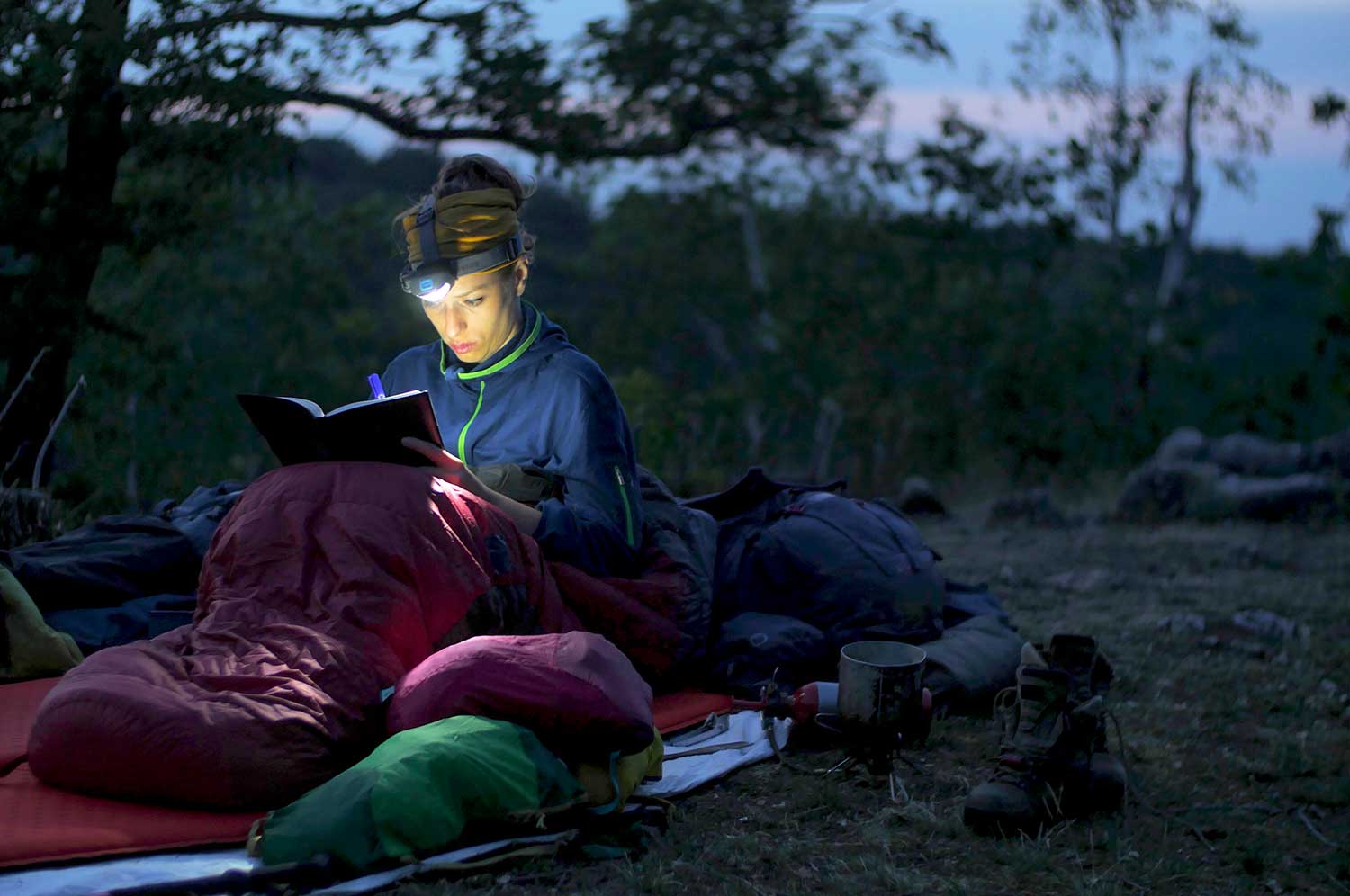
When camping outdoors, carrying a flashlight (or headlamp, or even a lantern if you have one) is imperative.
Flashlights can illuminate dark areas of the campsite or path and provide an extra layer of safety, especially in unfamiliar terrain.
If you arrive late at the campsite, these items will help you properly build a tent, light a fire, and set up a safe camp.
Take Duct Tape Everywhere With You
Taking duct tape with you can secure tent poles or replace lost parts of your tent. It can also make your tent structurally sound.
Duct tape is practical and applicable in various situations, from patching your rain gear in case it tears apart to using it as a hanger for food and other supplies.
The use of it depends on your creativity!
Think Well About the Food According To Your Eating and Cooking Habits
If you don’t like cooking, you can always bring dehydrated meals.
However, if you do, you should consider certain ingredients you want to include in your camping nutrition. Protein, fibers, carbohydrates, and electrolytes are valuable energy sources.
One of the most common practices is having a campfire. In that case, besides the food, you should take care of the firewood as soon as you arrive at the campsite.
If you have a special diet or medications, prepare it well before heading to camp.
Collect Yummy Yet Simple Recipes
Camping is exciting, but we have to think of many things before leaving the house, and it can all get overwhelming.
It is why you can get some quick but nutritious meals because you’ll need that energy. Check out our blog posts on easy and delicious camping breakfast, lunch, and dinner ideas.
Also, check our hassle-free camping vegan and vegetarian recipes if you prefer not to eat meat.
And don’t forget to bring some camping snacks to make your adventure more enjoyable.
You should also cook the food you know how to prepare. Don’t try to experiment on the campsite. After all, you don’t want to end up in the middle of nowhere with stomach issues.
Bring Enough Drinking Water
An approximate amount of water you’ll need is two gallons per person daily when you’re off camping. It depends significantly on the area you’re visiting, so you should do your best to inform yourself about nearby drinking water sources.
If these sources exist, you don’t have to carry all that water since it is heavy. In that case, it’s excellent to take reusable containers and refill them when you can.
Drinking water is essential to camping, as staying hydrated is crucial for maintaining good health and energy levels. You must ensure you have enough of it available every moment.
Purifying Water
We’ve just talked about the importance of drinking enough water during camping. However, if you don’t and need to purify it, there are a few ways.
The safest method is always boiling it. But, if you can’t do it for any reason, you can use different chemicals and filters to disinfect and filter it.
It’s important to acknowledge that filters don’t remove bacteria or viruses from the water and that certain parasites cannot kill even disinfectants.
Bring a Trowel For Digging a Potty Hole
A trowel is a valuable tool, but now we’ll discuss it as a toiletry essential. You might not use it if you visit the campground with existing toilets, but you’ll need it for number two in every other scenario.
The procedure is quite simple:
- Dig a small, around 6 inches deep, hole
- Do what you have to and bury it back with that same dirt
- Bring a bag for used toilet paper. It would be best never to leave it in nature as we campers respect the “Leave No Trace “policy.
Another option is to use a portable toilet or “wag bag,” specifically designed to dispose of human waste. You can get it at outdoor and camping supply stores.
Take a Shower Using Wet Wipes
You probably won’t be able to have a proper shower while you’re outdoors. That said, you don’t have to stay sweaty or muddy because there are ways to clean. One of them is to bring wet wipes and take a quick “shower “with them.
Again, the same rules go for the wet wipes as for the toilet paper – you shouldn’t throw it in the wilderness, but find a practical way for their disposal.
Extra tip: putting baking soda in a bag for that type of garbage can highly reduce the bad smell.
Be Careful With Setting Up a Campfire
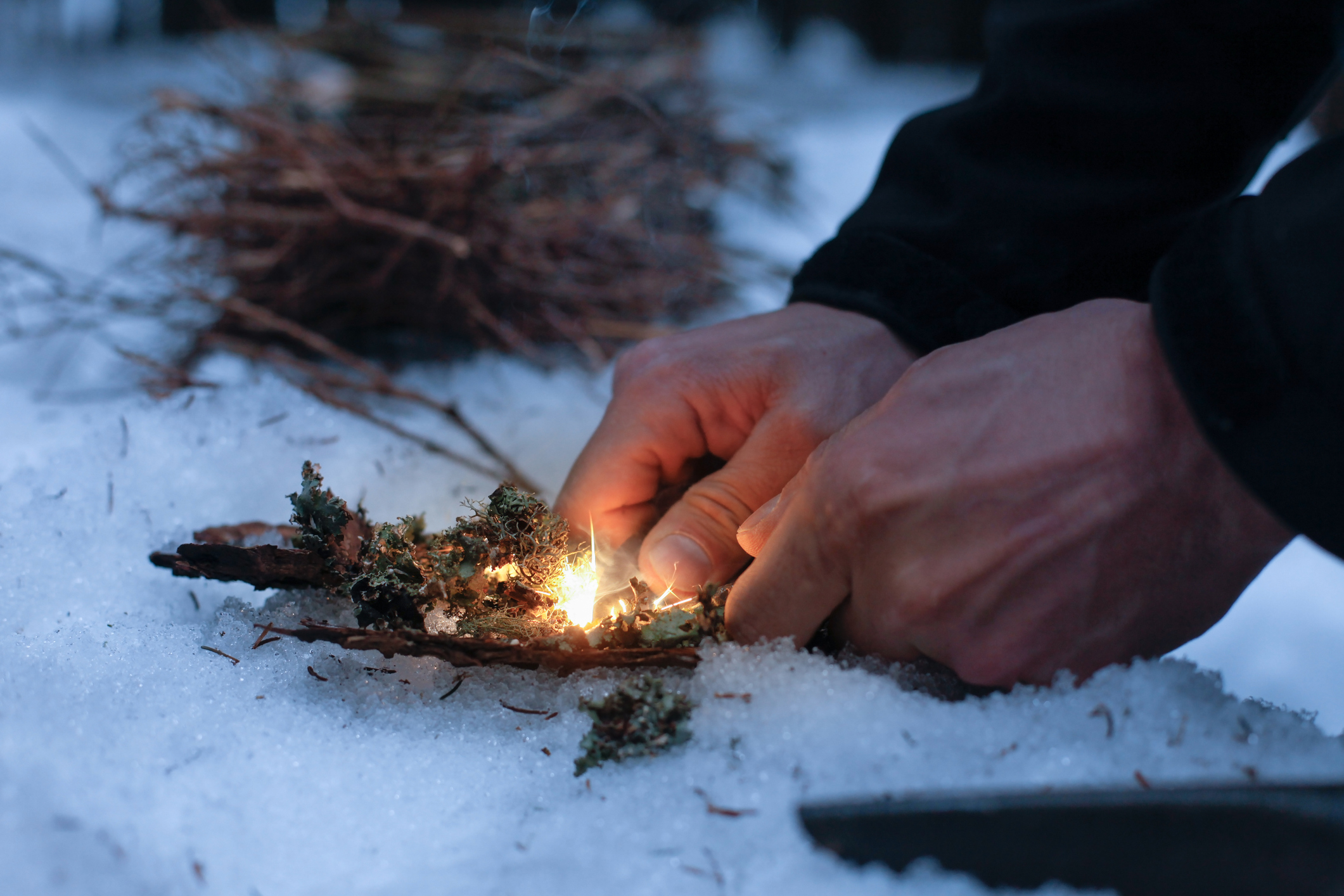
Setting up a campfire while camping in nature requires proper planning and preparation to ensure safety and comply with local regulations.
First of all, look for fire signs around the area. Sometimes it’s just forbidden to set it up. But if it’s not and you’re about to set it, then ensure you have enough water by the fire pit.
The fire should be kept small and under control at all times. It’s also important to note that wood collection is prohibited or limited in many places, so check before gathering firewood.
Gather only dead branches or twigs and use only a tiny amount; never cut live trees or branches.
Respect Other Fellow Campers
You should always consider that you might not be the only one to camp somewhere, especially if you’re visiting a popular campground.
Make sure to follow any posted rules or regulations at the campsite and be aware of any park or wildlife areas that may be nearby. Be considerate of other campers and be mindful of your environmental effects.
The “Leave No Trace” Principle
The “Leave No Trace” principle refers to an environmental advocacy campaign existing to promote responsible and eco-friendly outdoor recreation practices that protect the natural environment.
You should respect the environment, dispose of waste properly, minimize campfire impacts, and leave what you find as it is.
By following these principles, we can help protect the wilderness and ensure it remains a beautiful and pristine place for generations to come.
FAQ
What are 5 safety camping tips?
1. Always be aware of your surroundings and know the layout of the area you are camping in, including potential hazards such as poisonous plants or wild animals.
2. Have a plan for emergencies and ensure someone knows your itinerary and expected return time.
3. Keep a first aid kit on hand and know how to use it.
4. Use a tent with a rain fly and ground cloth to stay dry and protect against the elements.
5. Store food properly to avoid attracting wildlife. Use bear-proof canisters or hang food in a tree to protect it from bears and other animals.
What are the four most important things to take camping?
1. Shelter: A tent or other shelter is essential for protecting yourself from rain or extreme heat.
2. Sleeping gear: A suitable sleeping bag and pad are essential for staying warm and comfortable.
3. Lighting: A flashlight or headlamp, as well as additional light sources, such as a lantern, will allow you to navigate and perform tasks during the night.
4. Water and food: You will need a way to purify water and enough food to sustain you throughout your camping trip. Ensure you have enough water, and bring a water filter or purification tablets. Also, it’s worth getting some snacks or energy bars with you.
What To Do Next?
Now that you’ve come this far, you are almost ready for your big adventure. By being prepared, respectful, and aware of the surroundings, you can avoid common mistakes that people make and have a more enjoyable and safe camping experience.
Why “almost”? As I have already written, you can never be fully prepared but can be fully informed. With regular visits to nature, you’ll learn from your own experience, and maybe the following article on the topic will be yours. And with in-depth personal research, you’ll have an insight into the experience of others.
But if there is a way to wrap up this whole article in a final, single sentence, it would be something like this: give your best to collect valuable information, invest in essential gear, always take care of yourself and remember to “Leave No Trace.”
What do you think about this article? Feel free to write your thoughts, experience, and some fun stories in the comments. We would like to hear from you! Thank you
-
Aleksandar is a 31-year-old outdoor enthusiast with 10+ years of experience in camping and mounteering. He found the Bored Adventurer because he loves spending his free time exploring the wilderness and sharing his experience with other fellow outdoor enthusiasts. Whether it’s the mountains or the seaside, summertime or winter, he jumps at every chance to escape the city and return to nature. His other interests include photography, digital marketing, and film.
View all posts





